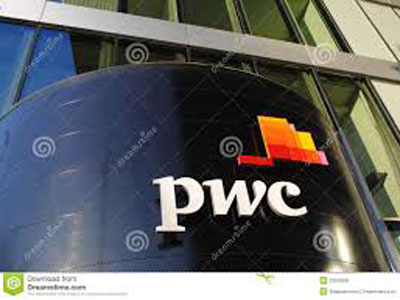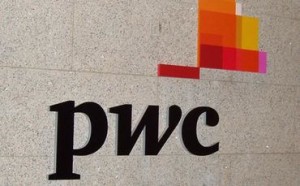Finance
PwC seeks improved economic ties between W’Africa, Lebanon

…Highlights investment opportunities in sub-region
LAGOS-PricewaterhouseCoopers (PwC) has called for further deepening of economic and trade relations between West Africa and Lebanon.
This call was made at a breakfast meeting recently hosted by the firm for Lebanese business leaders. The event, which was put together by PwC firms across West Africa, in collaboration with PwC in the Middle East, was aimed at providing informed analyses of the political and socio-economic status of the sub-region with the view to highlighting its immense investment opportunities.
 Partner and Energy leader at PwC Nigeria, Darrell McGraw noted that the economic indicators of West Africa make the sub-region an attractive destination for investments from across the globe and Lebanese businesses he said, must key into this, especially given the long historical relationship with West African countries.
Partner and Energy leader at PwC Nigeria, Darrell McGraw noted that the economic indicators of West Africa make the sub-region an attractive destination for investments from across the globe and Lebanese businesses he said, must key into this, especially given the long historical relationship with West African countries.
He said: ”There is no shortage of superlatives to describe West Africa and the potential of her economy. The abundance of natural resources, a population projected to reach 400 million by 2020, two-thirds of which are under twenty five and the deepening of democratic institutions across the region presents an attractive and stable environment for investment.
“We know that the region is home to over 150,000 Lebanese, many of whom have established successful businesses and we at PwC think there is room for the deepening of this mutual beneficial relationship especially by exploring the many untapped potential of the region”
Partner and Head of Tax services at PwC Lebanon, Wadih AbouNasr, who welcomed the participants and highlighted the current volumes of trade between Lebanon and the countries in West Africa, notably Nigeria, Ghana and Cote D’Ivoire, stressed specifically the areas in which opportunities exist.
The Development Director of South Energyx Nigeria Limited, Pierre Edde, who delivered the keynote address, explained that the design, planned infrastructure and investment opportunities in the new Eko Atlantic city being developed out of the Atlantic Ocean in Lagos, is expected to house over 250,000 residents and businesses in an area covering about 10 million square meters.
The Tax Partner at PwC Nigeria, Abolade Kehinde, spoke on the operational tax and risk factors involved in doing business in Nigeria, while Darrell McGraw gave a presentation on the possible economic scenarios for Nigeria in 2015 and 2016, following the successful general elections and the volatility in the global oil price.
Citing a recent PwC economic report on Nigeria, McGraw noted that despite oil’s importance to Nigeria, the real economy is largely insulated against falling oil prices, hence, the economy will continue to grow despite low oil prices.
The opportunities in Francophone Africa were also highlighted in a third presentation by Partner in Advisory and Audit for PwC in Cameroon, Douty Fadiga and Partner at PwC Cote d’Ivoire, Madeleine Tanoe.
with close to fifty top Lebanese business leaders from various sectors in attendance. Also on hand to engage the attendants were Andrei Ugarov, an Advisory Partner with PwC Nigeria and Nada ElSayed, Tax Partner at PwC Lebanon.
Business
Nigeria pays US$4.9 billion on petrol subsidy in 2024- NNPCL
It was however noted by Biztellers.com.ng, that although subsidy is back in effect, the main reason for that is the increasingly weak state of the Naira and the country’s extreme dependence on products importation. Also unlike the previous subsidy era, where several oil marketers were getting free subsidy refunds for unverified product importation, this subsidy era is witnessing only one importer, the NNPCL, which in effect is the sole receiver of government subsidies.
Yemie ADEOYE
INSPITE of the official position of the Nigerian government that the controversial petrol subsidy is gone for good as announced by the President on assumption of office, the state owned Nigerian National Petroleum Corporation Limited, NNPCL has disclosed that petrol subsidy is still fully operational in Nigeria, although, under a different identity.
Umar Ajiya, Chief Financial Officer at the NNPCL, disclosed that it cost the company a staggering N7.8 trillion (US$4.9) to cover this price gap in the first seven months of 2024.
Rather than simply referring to these claims as subsidies, he stated that the company is merely managing the price difference in petrol imports on behalf of the federation, stressing that this should not be misconstrued as a return to subsidy payments.
![]() This revelation has reignited discussions on whether the NNPC is indirectly offering subsidies, a concept typically defined as selling a product below its cost price.
This revelation has reignited discussions on whether the NNPC is indirectly offering subsidies, a concept typically defined as selling a product below its cost price.
Documents reviewed by Biztellers.com.ng showed that the term “subsidy” was used extensively in official correspondence between the NNPCL and the presidency, particularly in reference to the “shortfall.”
Recall that President Bola Tinubu reportedly approved NNPC’s request to utilize the 2023 final dividends due to the federation to offset these costs.
However, during a media briefing on Monday about the company’s 2023 audited financial statements, Ajiya refuted claims that the NNPC is involved in any subsidy scheme.
Ajiya further disclosed that the Nigerian government owes the NNPC N7.8 trillion ($4.9 billion) in subsidy-related debts for the period from January to July 2024.
In furtherance of his clarification to the News Agency of Nigeria (NAN), Ajiya insisted that no subsidy payments have been made to any marketer in the last nine years, citing the NNPC’s role as the sole importer of petrol under supply contracts.
He said, “In the last eight to nine years, NNPC Ltd. has not paid anyone a dime as a subsidy; no kobo has been disbursed by NNPC Ltd. in the name of subsidy. No marketer has received any payment from us for subsidy.”
“What has been happening is that we have been importing PMS, which has been landing at a specific cost price, and the government tells us to sell it at half price. So the difference between the landing price and that half price is a shortfall.
“And the deal is between the Federation and NNPC Ltd., to reconcile, sometimes they give us money, so there is no money exchanging hands with any marketer in the name of subsidy.”
Ajiya remained silent on how much of the $4.9 billion could have been remitted to the federation account if the NNPC had not been covering the “shortfall.”
It was however noted by Biztellers.com.ng, that although subsidy is back in effect, the main reason for that is the increasingly weak state of the Naira and the country’s extreme dependence on products importation. Also unlike the previous subsidy era, where several oil marketers were getting free subsidy refunds for unverified product importation, this subsidy era is witnessing only one importer, the NNPCL, which in effect is the sole receiver of government subsidies.
Banking
CBN Denies Currency Devaluation

The Central Bank of Nigeria (CBN) has refuted claims of devaluing the.
Earlier reports suggested that the CBN had devalued the Naira, lowering its exchange rate from N631 to the dollar, compared to the previous day’s rate of N461.60 at the Importers and Exporters (I&E) window.
However, the Central Bank of Nigeria (CBN) released a statement on Thursday through its Acting Head of Corporate Communications, Dr. Isa Abdulmumin, categorizing the report as false information.
In the statement titled ‘CBN Has Not Devalued The Naira’, he said the attention of the apex bank was drawn to the news report by an Abuja based newspaper edition of June 1, 2023, titled “CB Devalues Naira To 630/51”.
However, the CBN stated categorically that the news report was replete with outright FALSEHOODS and destabilizing innuendos, ‘reflecting potentially willful ignorance of the said medium as to the workings of the Nigerian Foreign Exchange Market.’
“For the avoidance of doubt, the exchange rate at the Investors’ & Exporters (I&E) window traded this morning (June 1, 2023) at N465/USS1 and has been stable around this rate for a while.
“The public is hereby advised to ignore the news report by Daily Trust in its entirety, as it is speculative and calculated at causing panic in the market,” the CBN spokesman added.
He, therefore, advised media practitioners to verify their facts from the Central Bank of Nigeria before publishing in order not to misinform the public.
Banking
BREAKING: CBN Increases Interest Rate By 0.5%

The interest rate in Nigeria has been raised to 18.5 percent, up by 0.5 percent, from 18 percent where it was pegged in March 2023.
The Central Banks of Nigeria’s (CBN) Monetary Policy Committee (MPC) resolved to this effect at its third meeting of 2023 in Abuja, on Wednesday.
Governor, CBN, Godwin Emefiele, made the disclosure in the communiqué of the MPC’s meeting, thereafter.
While engaging the media at the end of the two-day meeting, Emefiele, said the committee voted to keep the asymmetric corridor at +100 and -700 basis points around the MPR.
In the view of the MPC, rising inflation rate is traceable to the high energy cost and challenges around the supply chain, among others, which lie outside the corridors of the CBN.
Emefiele said, “The current trend in price development would continue to be monitored by the bank with greater collaboration with fiscal authority to address the drivers of inflation.”
Biztellers reports that the CBN had effected six consecutive interest rate increases, which has seen the rate move from 11.5 percent in March 2022 to 18.5 percent in May 2023.













